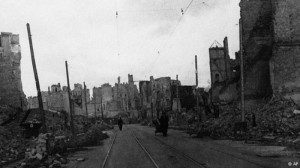8 May 1945 is a very important day in European history. It signified the unconditional surrender of the “Daisies” in Berlin. The Red Army occupied many city centers and celebrated their victory over the “Daisies”. Berliners continued, for the most part, to resume their normal activities. They were forced to begin to rebuild and find food in order to promote a sustainable life.

The former Third Reich was in shambles. Germany’s streets were filled with craters from air bombs, vast rubble fields, and a dust hung in the air. One could see the war effects from anywhere in the Third Reich. The scenes illustrated losses for both sides in the conflict: Germans and Russians/British/Americans. Berlin was especially well-hit. Not only did it have to recover from physically damage, but it also lost out on many goods that were stolen. However, even though some Russians partook in the theft, higher officials established order to take control of the situation.
The Soviet Union established order in Berlin to hopefully distribute food and other supplies to those citizens in need. Of course, rationing was still in effect because food resources were far from plentiful. However, the Russians tried hard to improve the amount distributed to citizens and made an effort to establish soup kitchens to help serve the hungry public. Although it was a difficult pill to swallow for many Berliners, the Soviets tried their best to make the situation as positive as it could be following a brutal, long world war.
Women were extremely tense due to the fact that their military men could have died or been arrested. The Red Army would monitor the city throughout the next few weeks, taking anything of value that they wanted because they had Germany under control. Sooner rather than later, Berlin started to be cleaned in order to begin the rebuilding process. After years of war, Berliners were glad to move on from the death and misery of fighting two world wars in a span of about thirty years. Berlin would soon rise to the top of Europe in the decades to come.
In closing, WWII caused a huge amount of destruction across Europe and abroad. Millions of innocent Jews lost their lives in the Holocaust. Millions of soldiers on both sides lost their lives in battle. Millions of Berliners and other Aryans feared for their lives on almost a nightly basis due to the air raids of the Royal Air Force. 8 May 1945 marked a new beginning for Germany as well as Europe as a whole.
